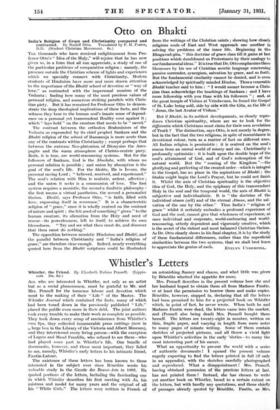Otto on Bhakti
India's Religion of Grace and Christianity compared and contrasted. By Rudolf Otto. Translated by F. H. Foster, D.D. (Student Christian Movement. 6s.) TEE thousands who have received enlightenment from Pro- fessor Otto's " Idea of the Holy," will rejoice that he has now given us, in a form that all can appreciate, a study of one of the particular problems of comparative religion : namely, the presence outside the Christian scheme of lights and experiences which we specially connect with Christianity. Modern students of Hinduism have more and more drawn attention to the importance of the Bhakti school of devotion or " way of love," as contrasted with the impersonal monism of the Vedanta ; finding here many of the most precious values of personal religion, and numerous striking parallels with Chris- tian piety. But it has remained for Professor Otto to demon- strate the deep theological implications of these facts, and the witness they bear to the human soul's innate sense of depend- ence on a personal yet transcendent Reality over against it ; which " lays hold " on the creature that needs to be " saved."
The contrast between the orthodox Brahminism of the Vedanta as expounded by its chief prophet Sankara and the Bhakti religion of the school of Ramanuja is more acute than any of the contrasts within Christianity ; except perhaps that between the extreme Neo-platonism of Dionysius the Areo- pagite and the warm atmosphere of Christo-centric piety. Both, it is true, are world-renouncing systems. But for the followers of Sankara, God is the Absolute, with whom no personal relation is possible ; and union by absorption is the goal of the soul's life. For the bhakta, He is Isvara, the personal saving Lord ; " believed, received, and experienced." The soul's relation with Him is realistic, ardent, affective ; and the union it seeks is a communion of love. The first system requires a monistic, the second a dualistic philosophy : the first means a virtual pantheism, the second a personalist theism. Bhakti, says Professor Otto, " is faith, filled with love, expressing itself in reverence," It is a characteristic religion of " grace," since it is wholly centred on the contrast of nature and spirit ; the felt need of something " given " to the human creature, its alienation from the Holy and need of rescue—its powerlessness, left to itself, to achieve its own blessedness. " Try and see what thou canst do, and discover that thou canst do nothing."
The opposition between monistic Hinduism and Dhakti, and the parallel between Christianity and " India's religion of grace," are therefore clear enough. Indeed, nearly everything quoted here from the Bhakti scriptures could be illustrated
from the writings of the Christian saints ; showing how closely religious souls . of East and West approach one another in solving the problems of the inner life. Beginning in the Bhagavad-gita, " this doctrine of grace rises till it gains at last positions which dumbfound us Protestants by their analogy to our fundamental ideas." It is true that Dr. Otto emphasizes these likenesses by his use of Christian ascetic language concerning passive surrender, synergism, salvation by grace, and so forth. But the fundamental similarity cannot be denied, and is even acknowledged by spiritually minded Hindus. Thus a venerable Bhakti teacher said to him : " I would sooner become a Chris- tian than acknowledge the teachings of Sankara ; and I have more fellowship with you than with his followers " ; and, at the great temple of Vishnu at Vrindavana, he found the Gospel of St. Luke being sold, side by side with the Gita, as the life of `! Jesus, the.last Avatar of Vishnu."
But if Bhakti, in its noblest developments, so closely repro- duces Christian spirituality; where are we to look for the differentia which Christians must claim for their own revelation of Truth ? The distinction, says Otto, is not merely in degree, but in the fact that the two religions, in spite of resemblance in devotional colour, turn as a matter of fact on different axes. All Indian religion is pessimistic : it is centred on the soul's rescue from an unreal world of misery and sin. Christianity is profoundly optimistic : it is built upon the double hope of the soul's attainment of God, and of God's redemption of the natural world. But the " coming of the Kingdom "—the glorifying and perfecting of the created order—which is integral to the Gospel, has no place in the aspirations of Bhakti : the bhakta might begin the Lord's Prayer, but he could not finish it. Whilst the axis of Christian spirituality is the objective idea of God, the Holy, and the epiphany of this transcendent Holy in the soul and the temporal world, the axis of Bhakti is subjective and individualistic It is " the doctrine of the individual atman (self) and of the eternal Atman, and the sal- vation of the one by the other." Thus India's " religion of grace " whilst it certainly embodies a profound experience of God and the soul, cannot give that wholeness of experience, at once individual and corporate, world-embracing and world- renouncing, utterly dependent and vigorously creative, which is the secret of the richest and most balanced Christian theism. As Dr. Otto clearly shows in his final chapter, it is by the study of these fundamental differences, rather than the superficial similarities between the two systems, that we shall best learn






































 Previous page
Previous page